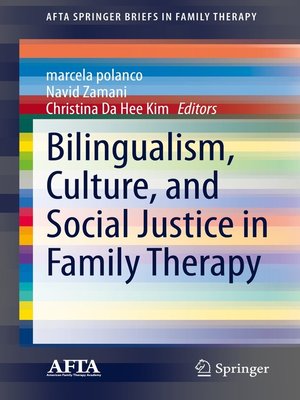Bilingualism, Culture, and Social Justice in Family Therapy
ebook ∣ AFTA SpringerBriefs in Family Therapy
By marcela polanco

Sign up to save your library
With an OverDrive account, you can save your favorite libraries for at-a-glance information about availability. Find out more about OverDrive accounts.
Find this title in Libby, the library reading app by OverDrive.



Search for a digital library with this title
Title found at these libraries:
| Library Name | Distance |
|---|---|
| Loading... |
This volume advocates for justice in language rights through its explorations of bilingualism in family therapy, from the perspectives of eighteen languages identified by the authors: Black Talk/Ebonics/Slang, Farsi, Fenglish, Arabic, Italian, Cantonese Chinese, South Korean, Mandarin Chinese, Vietnamese, Spanish, Chilean Spanish, Mexican Spanish, Colombian Spanglish, Madrileño Spanish, Spanglish, Pocho Spanish, Colloquial Spanish, and English. It identifies standard English as the current language most often used across family therapy programs and services in the United States. The book discusses efforts to respond to the rapidly changing linguistic landscape and the increasingly high demand for appropriate therapy services that respond effectively to diverse families in America. It discusses recruitment and training of linguistically diverse family therapists and strategies to promote linguistic equality to support the rights of family therapists, their practices, and the communitiesthey serve. Chapters explore ways to integrate languages in professional and personal lives, including the improvisational, self-taught translanguaging skills and practices that go beyond the lexical and grammatical rules of a language. The book describes the creative use of native or heritage languages to ensure that the juxtaposition of English therapeutic and daily-life landscapes is integrated into family therapy settings. It discusses contextual, relational, therapeutic, and training potential offered by bilingualism as well as the necessary transmutations in theory and practice. This volume is an essential resource for clinicians, therapists, and practitioners as well as researchers, professors, and graduate students in family studies, clinical psychology, and public health as well as all interrelated disciplines.







